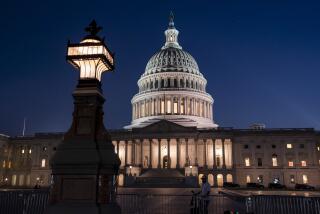House Approves Sino-U.S. Nuclear Pact
- Share via
WASHINGTON — The House of Representatives on Wednesday approved a controversial nuclear cooperation agreement between the United States and China, but opponents continued to press for legislation placing tighter restrictions on the pact.
By a vote of 307 to 112, the House accepted a resolution passed by the Senate on Nov. 21 that approves the pact and requires President Reagan to certify that China has agreed it will use U.S. nuclear technology only for peaceful purposes.
But liberal opponents of the agreement, refusing to accept defeat, later asked a House-Senate conference committee to approve another proposal, passed by the Senate, that would halt implementation of the pact until China agrees to additional nuclear non-proliferation safeguards.
That measure, sponsored by Sen. John Glenn (D-Ohio), was passed Tuesday by the Senate as an amendment to a stopgap spending bill that would fund the government beyond midnight today.
Glenn Presses Issue
Glenn, in a letter to the conferees, argued that his amendment should be retained to assure that the Chinese do not convert U.S. nuclear technology to other purposes. He disputed the Reagan Administration’s contention that the measure effectively would kill the Sino-American pact.
In the House, opponents of the agreement were angry that their rules prohibited them from voting for the Glenn amendment, too.
“The agreement is a terribly flawed agreement,” said Rep. Howard Wolpe (D-Mich.), who contended that the Chinese could easily convert U.S. nuclear technology for use in weapons or could share it with nations that do not already have nuclear capabilities.
After failing to defeat the pact in the House, Wolpe and 18 other House members sent a letter to the conference committee expressing support for the Glenn amendment.
The nuclear agreement was concluded during President Reagan’s trip to Peking in April, 1984, and technically took effect last Tuesday. The Glenn amendment would deprive the government of money to implement it, however.
Cranston Drops Opposition
Earlier, a number of liberals, including Sen. Alan Cranston (D-Calif.), dropped their opposition to the pact when the legislation approving it was amended to require some safeguards acceptable to the Chinese government.
“No” votes came Wednesday from liberals whose fears of the spread of nuclear weapons were not satisfied, as well as conservatives who support Taiwan.
In Peking, the Chinese government Wednesday rejected the Glenn amendment as “completely unacceptable.” The Chinese have repeatedly denied intelligence reports that they already have violated international non-proliferation standards by helping nations such as Pakistan, Iran, South Africa, Brazil and Argentina develop nuclear weapons.
More to Read
Sign up for Essential California
The most important California stories and recommendations in your inbox every morning.
You may occasionally receive promotional content from the Los Angeles Times.













